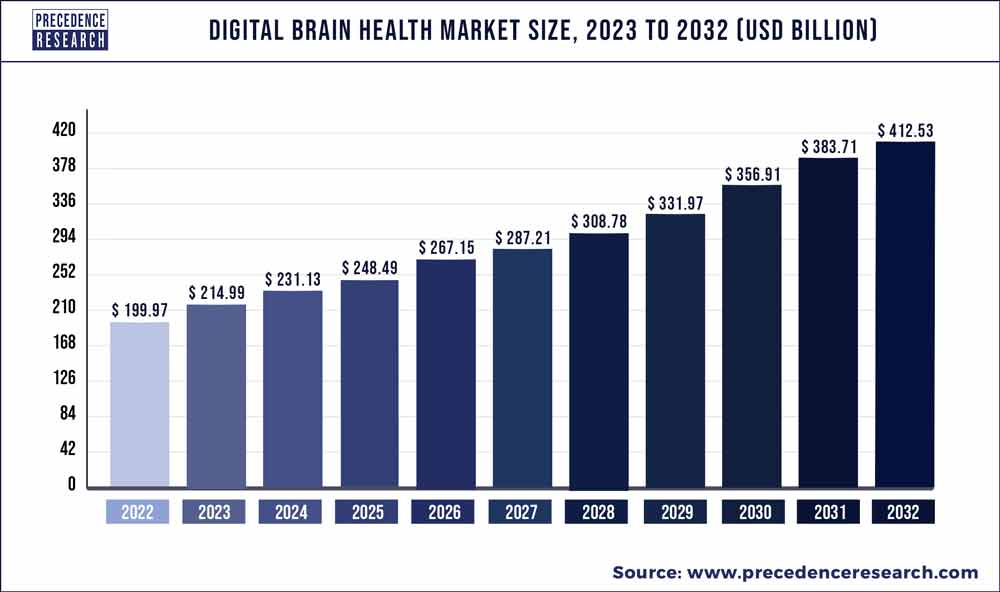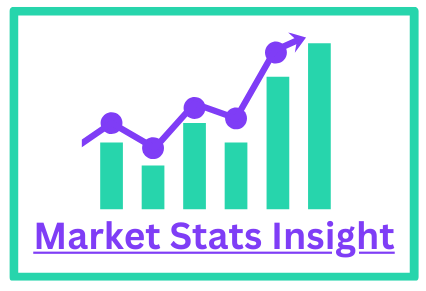The global digital brain health market size surpassed USD 214.99 billion in 2023 and is expected to hit around USD 412.53 billion by 2033, poised to grow at a CAGR of 7.51% from 2023 to 2032.

Digital Brain Health Market Trends
Rise of Cognitive Training and Brain Fitness Apps
Cognitive training and brain fitness apps are designed to enhance various cognitive functions such as memory, attention, problem-solving, and mental agility. These apps are gaining popularity among a diverse user base, from students looking to improve academic performance to older adults aiming to maintain cognitive health. Companies like Lumosity, Elevate, and Peak provide gamified exercises that make cognitive training engaging and accessible. Additionally, the integration of adaptive learning algorithms helps these apps tailor exercises to individual performance levels, maximizing their effectiveness.
Growing Interest in Mental Wellness
Mental wellness is gaining recognition as an essential component of overall health. This shift is reflected in the rising demand for products and services that promote mental well-being, including mindfulness apps, relaxation tools, and stress management programs. Companies like Headspace and Calm offer guided meditation and mindfulness exercises aimed at reducing stress and improving emotional resilience. There is also a growing market for workplace wellness programs that support employees’ mental health, leading to improved productivity and job satisfaction.
Advancements in Neuroimaging and Neurofeedback
Neuroimaging and neurofeedback technologies are advancing our understanding of brain function and enabling more precise diagnostics and interventions. Neuroimaging techniques, such as fMRI and PET scans, provide detailed insights into brain activity and structure, helping to identify abnormalities associated with neurological disorders. Neurofeedback involves training individuals to regulate their brain activity using real-time feedback from EEG sensors. This technique is used to treat conditions like ADHD, anxiety, and depression by helping patients develop healthier brain activity patterns. Continued advancements in these technologies promise to enhance diagnostic accuracy and treatment efficacy.
Read more: Behavioral Health Market Size to Hit USD 310.82 Billion by 2033
Digital Brain Health Market by Functionality
- Market Segmentation: The digital brain health market is segmented by functionality into several categories: electronic health records (EHR), clinical functionality, care plans/health management, clinical decision support (CDS), administrative functionality, e-prescribing, telehealth, financial functionality, and others.
- Dominant Segment: The clinical functionality segment holds the largest market share. This segment includes tools designed for healthcare providers, aiding in the clinical assessment, diagnosis, and treatment of brain health disorders.
- Importance of Clinical Tools: These tools encompass digital assessments, therapy programs, and remote monitoring solutions. They address key challenges such as limited specialist access, high treatment costs, and stigma associated with seeking brain health care.
- Benefits: Digital clinical tools improve access to care, reduce costs, and enhance patient outcomes through earlier diagnosis and treatment of brain health disorders.
Digital Brain Health Market by Component
- Market Segmentation: The market is divided into devices and software.
- Dominant Segment: Software accounts for the majority of the market due to its flexibility, scalability, and cost-effectiveness compared to hardware solutions. Software can be easily updated and customized for evolving healthcare needs.
- Range of Solutions: The software segment includes mobile apps, telehealth solutions, clinical decision support systems, and electronic health records. These tools support patient care and enhance outcomes, driving the demand for digital brain health software.
Digital Brain Health Market by End-User
- Market Segmentation: The market is divided into specialty clinics, hospitals, and others.
- Dominant Segment: Hospitals represent the largest market share. They offer extensive healthcare services and cater to a high volume of brain health disorder patients.
- Benefits for Hospitals: Digital solutions help hospitals improve patient outcomes, reduce costs, and enhance operational efficiency. These benefits are achieved through earlier diagnosis, effective treatment, and better patient care management.
Collaborations and Partnerships in the Digital Brain Health Market
Technology Development and Integration
Integration of Technologies:
- Wearable Tech Companies and App Developers: Companies producing wearable devices, such as Fitbit and Apple, collaborate with app developers to integrate cognitive health monitoring features. These integrations allow for real-time data collection and personalized cognitive training programs.
Clinical Validation and Medical Endorsements
Healthcare Providers and Digital Health Companies:
- Partnerships between healthcare providers and digital brain health companies are essential for clinical validation of new tools and technologies. These collaborations help in conducting large-scale clinical trials and obtaining necessary certifications and approvals from medical bodies like the FDA.
- Medical endorsements from reputable health organizations enhance credibility and trust in digital brain health solutions, encouraging wider adoption among consumers and healthcare professionals.
Market Expansion and Distribution
Cross-Industry Partnerships:
- Insurance Companies: Collaborations with insurance providers can lead to the inclusion of digital brain health solutions in health plans, making them more accessible to a broader audience. For example, some insurance companies offer incentives for using brain health apps as part of wellness programs.
- Corporate Wellness Programs: Partnerships with large corporations to integrate digital brain health tools into employee wellness programs are increasingly common. These collaborations promote mental well-being in the workplace and provide companies with data-driven insights into employee health.
Global Expansion:
- Partnerships with international distributors and local companies enable digital brain health firms to enter new markets more effectively. These local partnerships help navigate regulatory landscapes, cultural differences, and market dynamics in various regions.
Education and Awareness
Non-Profits and Advocacy Groups:
- Collaborations with non-profit organizations and mental health advocacy groups help raise awareness about the importance of brain health. Joint campaigns and educational programs can reach a wide audience, promoting the adoption of digital brain health tools.
- Public Health Initiatives: Working with government bodies and public health organizations to integrate digital brain health solutions into public health initiatives ensures wider reach and greater impact on community health.
Data Sharing and AI Development
Data Sharing Agreements:
- Partnerships focused on data sharing between different entities, such as hospitals, research institutions, and tech companies, are crucial for advancing AI and machine learning models used in digital brain health. Shared data pools improve the accuracy and effectiveness of cognitive assessments and personalized interventions.
AI and Machine Learning Collaborations:
- Joint ventures between AI specialists and brain health companies foster the development of sophisticated algorithms capable of early detection of cognitive decline and personalized brain training regimes. These collaborations often involve interdisciplinary teams, combining expertise from neuroscience, data science, and software development.
Digital Brain Health Market Leading Companies:
- Linus Health
- Medibio
- The Echo Group
- Spring Care
- Inc. Qualifacts Systems, Inc.
- NXGN Management
- Netsmart Technologies
- IBM
- Holmusk
- Core Solutions, Inc.
- Cerner Corporation
Segments Covered in the Report:
By Functionality
- Electronic Health Records (EHR)
- Care Plans/Health Management
- Financial Functionality
- Clinical Functionality
- Clinical Decision Support (CDS)
- E-Prescribing
- Telehealth
- Administrative Functionality
- Others
By Component
- Software
- Devices
By End-User
- Specialty Clinics
- Hospitals
- Others
By Geography
- North America
- Europe
- Asia-Pacific
- Latin America
- Middle East and Africa
Immediate Delivery Available | Buy This Premium Research Report@ https://www.precedenceresearch.com/checkout/2804
